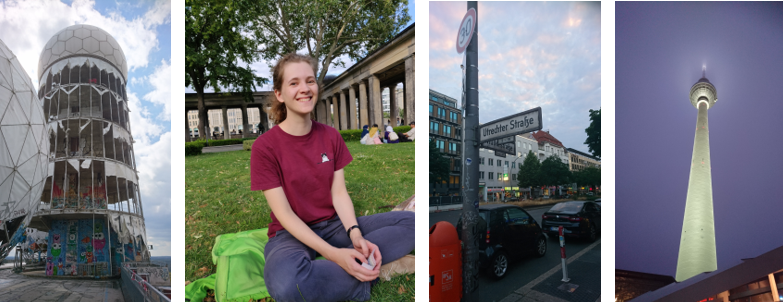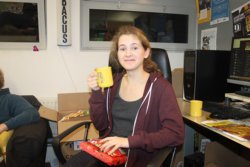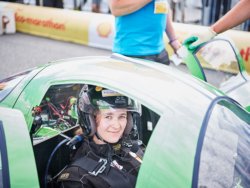Mathematics is a hobby and a way to solve (social) problems
Interview with Yanna Kraakman by Diana Dalenoord
Mathematics was for Yanna a way of relaxation. So it is not a surprise that she chose a study with a lot of mathematics. She ended up, after a great search, with the Bachelor (and Master) in Applied Mathematics and has applied her mathematical knowledge to several projects. Some of those projects are explained below.
Skating motion modelling
One of the fun module assignments I did was about motion modelling. Together with my peers, we decided to model the movements of a skater. To do this, I set up differential equations for someone who was making skating movements. This was quite difficult and I watched many videos of how skaters move. In this assignment, we used differential equations, programmed an animated movie, looked at what gravitational forces were involved and at what speeds they were moving, for example, at the drop-off at the start.
The Solar System
Modelling is an important part of mathematics. This came up again during the assignment to model the solar system. We modelled several planets orbiting around our sun and a moon around one of those planets and looked at how the system behaved. In doing so, it is important to pick the right speed for each planet/moon. Otherwise, they might fly out of orbit or burn because they get too close to the sun. We orbited a moon around our sun and looked at how the planets behaved in relation to each other. In addition to modelling and physics, programming was also involved during this assignment, which I enjoyed.
Studying after the bachelor's degree in Applied Mathematics
After my bachelor’s graduation, I decided not to say goodbye to mathematics just yet. I get very happy with mathematics, so it was logical to make the step to the Applied Mathematics Master. I decided to continue studying within Prof. Marc Uetz's research group, Discrete Mathematics and Mathematical Programming.
Internship at UT-Start-up QbayLogic
QBayLogic is a digital design and consultancy company. Their focus is on leveraging FPGA technology in domains with difficult mathematical problems and solutions that need low latency and high performance. FPGA (field-programmable gate array) is an integrated circuit consisting of programmable logic components. They can be programmed as logic functions such as AND and XOR. These functions can be, for example, decoders or simple mathematical functions.
My assignment was to write a program that checks if a function terminates, i.e. generates an answer for any input variable, or may get stuck in a loop. It was an exciting assignment because I was working out of my comfort zone: in a field linking mathematics with theoretical computer science. I learned a new programming language (Haskell) that I had not learned at UT and I learned what a formal language is (basically my own simple programming language) and how to program one.
The program that I created was to be used within the compiler that the company worked with. Such a compiler translates source code to computer code and simplifies the code when possible. The compiler cannot handle code that gets stuck in infinite loops, since this ultimately would result in an infinitely large FPGA chip, so this is where my program would come in handy.

Graduating project in Berlin
Through Marc Uetz, I received an interesting and challenging graduation assignment at the Technical University of Berlin. In Corona time, this meant that I mostly did my research alone in a room with occasional help from my German supervisor Prof. dr. Max Klimm and remotely, via online video calls, with Marc. My assignment was about the Price of Anarchy, which took me into the world of game theory.
The Price of Anarchy gives information about the possible outcomes of a game with multiple players. In particular, it compares the outcome when the players play selfishly with the optimal outcome reached by working together. An example of a game is the Prisoners Dilemma, in which the overall outcome is best if the prisoners work together, even though this does not make sense from a selfish perspective. You may not always achieve the greatest benefit yourself, but you do ensure that the group achieves the best result.
My assignment was about the Price of Anarchy of a specific, abstract type of game. This game can be interpreted as a situation in which there are several computers and many employees who at the same time all need multiple computers to run computations. The more employees use the same computer, the slower it becomes. Selfishly, everyone wants to use the fastest computers. However, by working together and optimizing the distribution of computers, the employees may be done earlier on average. I have proved that in such games, the average computation time if players play selfishly may be up to twice as long as if they work together. It is thus really valuable to hire a supervisor who can optimize the distribution of the computers.
An experience abroad
It is great fun to do a part of your study abroad. I did my research on my own in the office (due to Covid), but during lunchtime, we went for a nice lunch together, with all the department employees. Berlin is a hip and modern city with lots of opportunities to soak up culture and party in Techno Clubs or by going to a Rave. And my German has improved as well.

Student Life
As a student, your life doesn't just consist of math and studying. I was a member of WSG Abacus, attended many activities and joined committees, so I got to know many students. It gave me a good feeling to be a member of this cool study association.

I was also a member of the Green Team Twente for a year. We investigated how we could drive a race track with our hydrogen car in the most economical way. As a strategy engineer, I calculated how you should drive at certain points (e.g. a corner) to be as economical as possible. I was also the driver and we had a test day on the Zandvoort circuit. It is very special to drive on such a circuit with a hydrogen car that drives 15km per hour, while Max Verstappen drove laps of over 300km/h. In the 2018/19 academic year we not only became European Champions, but in June 2019 we also became World Champions in London. It was great to be part of such an enthusiastic team.
What’s next
I recently completed my master's degree in Applied Mathematics cum laude. And now, I am looking for a (research) job where my expertise in network/graph theory, game theory, optimization, automata and programming come in handy. Looking forward to my next challenge.
